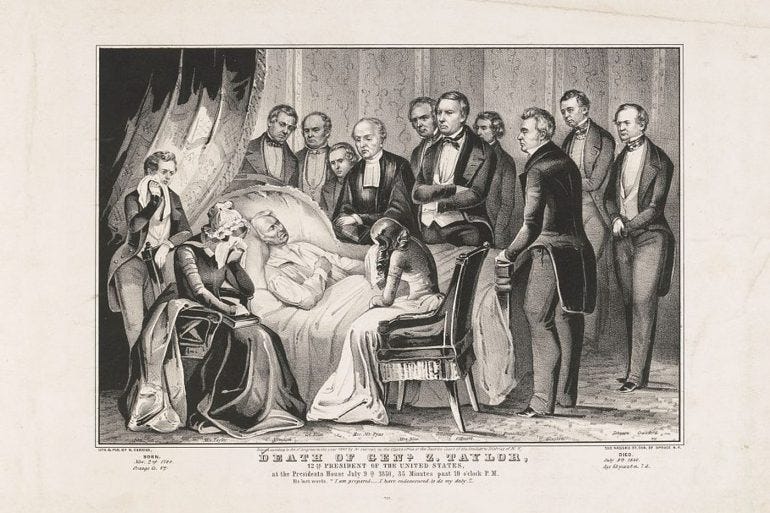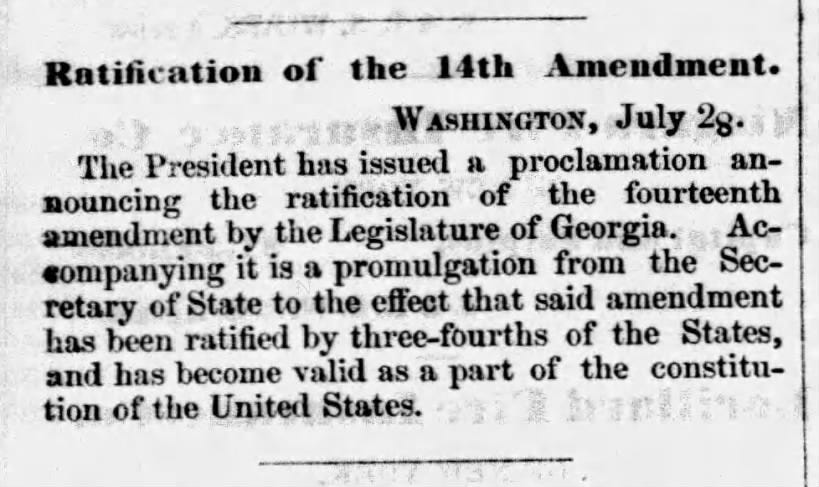Commander-in-Heat: A Republic, If It Can Survive You
If you’re a president looking to beat the heat this summer, bad news: There’s a good chance you won’t.
Presidential Summer Clearance
History doesn’t repeat itself, but my mortgage bill does. To keep SMK sustainable, I’m offering a summer special and an experiment:
Become a paid subscriber during July—the deadliest month for U.S. presidents—and you’ll get 40% off for the next 12 months.
An experiment! Community is a form of currency, too, so if you truly cannot pay me for my intellectual labor, here’s another way:
—Click on the “share” button and send any post(s) to ten different people.
—Encourage six people to sign up as free/paid subscribers and note you as a referral.
At the end of July, I’ll check the stats and send you a 3 month gift subscription.1
Drop While It's Hot
June was out for blood but July finished the job. It claimed more commanders-in-chief than any other month—which makes it the perfect time to launch a new series.
Each newsletter will touch on an American presidents who didn’t live to enjoy a final leaf peeping season. But don’t fret! The republic keeps going, even when its leaders don’t. That was George Washington’s most ardent wish—but more on that soon.2
Presidential Summer Clearance FAQs 3
Is it really a pattern or are you just doing a bit?
Both, almost always. But there’s compelling evidence:
The U.S. has had 47 presidents. 39 of those presidents have died. 13 of those deaths were in June or July.
A third of all presidents died during the summer, making it the most fatal season for former commanders-in-chief.
Why announce this today?
One answer: I thought of it yesterday.
Another: The reason I thought of it. Today in 1850, President Zachary Taylor died of “cholera morbus,” likely acute gastroenteritis. (See artistic rendering above.)
Five days earlier, Taylor celebrated July 4th by gorging on cherries and iced milk under a punishing sun. His bowels revolted, his organs followed, and by the ninth, he was gone.
Why so many summer deaths?
I have theories. None are satisfying.
Pre-air conditioning medicine: The 19th century was unkind to aging bodies—and bodies in general.
Old age: Most presidents live long enough to die of it.
Karma: Unprovable but also very provable.
How long will this series be running?
Open-ended—like executive power. It begins in earnest in a few days, with the occasional detour between dispatches.
Given my career path, it’s safe to say I’m in this for the long death.
When will it start in earnest?
I mean, I feel like this is a pretty good start…but you can expect more soon.
And if morbid presidential deep dives just aren’t your thing, fear not: It won’t be my only offering. I’ve got plenty of essays lined up that don’t involve cherries, cholera, or commanders-in-grief.
On an Unrelated Note
Sharing a delightful primary source James Graham Wilson sent me the day my new American history column debuted at the New York Times Book Review —and his excellent books:
America's Cold Warrior: Paul Nitze and National Security from Roosevelt to Reagan
July 9th: Heatstroke, Holy Rhetoric, and the American Way
1846
U.S. naval forces sailed into the sleepy Mexican port of Yerba Buena, planted a flag on what would soon be called Portsmouth Square, and claimed San Francisco for America. No one voted. No treaty was signed. But that didn’t stop Commodore John D. Sloat from calling it liberation. A military occupation spun as a real estate deal—classic American expansion care of James K. Polk.
1850
As I mentioned above, President Zachary Taylor died of “cholera morbus,” likely acute gastroenteritis. Five days earlier, he’d celebrated the Fourth of July by gorging on cherries and iced milk under a punishing sun. His bowels revolted, his organs followed, and by the ninth, he was gone. Enter Millard Fillmore, a compromise candidate who would go on to sign the Fugitive Slave Act, ensuring that no Black person was ever safe, even in a free state.
1863
After 48 days of trench rot and starvation, Confederate forces surrendered Port Hudson, Louisiana. It was the longest siege in American history and the final link in the Union’s plan to choke the South by seizing the Mississippi. Lincoln called it “a job well done.” Thousands of Black troops fought and died there, but only one side got monuments.4
1868
The 14th Amendment was ratified, granting birthright citizenship and “equal protection of the laws” to formerly enslaved people. White Southerners ignored it. White Northerners forgot it. The Supreme Court rewrote it. But it remains the shaky legal spine of civil rights, LGBTQ protections, and reproductive freedom—proof that one amendment can do a lot of heavy lifting when democracy refuses to.
1877
The All England Lawn Tennis and Croquet Club held its first Wimbledon tournament. Twenty-two gentlemen competed. Women weren’t allowed. Spectators sipped Pimm’s, the Empire held, and no one asked what the workers were doing. (Answer: striking across the U.S., including a general railroad strike that summer. But sure, let’s talk backhand.)
1896
At the Democratic National Convention in Chicago, William Jennings Bryan rose, arms outstretched, and crucified the gold standard on a metaphor. His “Cross of Gold” speech was equal parts sermon, populist revolt, and political theater. Bryan would lose the election—and then two more.
See you soonish! In the meantime, you can find me on Instagram and, on occasion, Bluesky and Twitter. My books are at Bookshop, Amazon, and your local bookstore or library. If you’d like me to sign or personalize my books, purchase copies from Oblong Books.
I suspect there will be caveats, like the email addresses must be real (i.e. not bounce back immediately), the recipients must open the email/click on a link, etc.
I’ve got other essays ready lined up, so those who prefer their dead president talk with a little less death, no worries, I got you.
I mean, I’ve asked them frequently.
Thanks to the conservative/media obsession with monuments, I’ve come to resent them—which is, as we all know from failed relationships, one of the four horsemen.








Well, that was fun. Thanks.